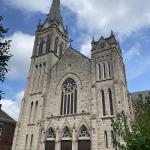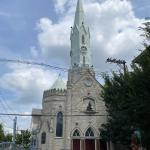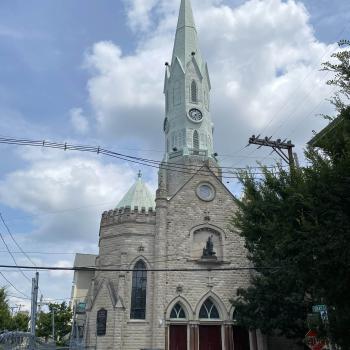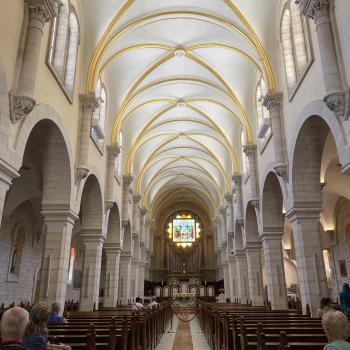The worst fate that you could possibly conceive of isn’t found solely along the fringes of one’s imagination. It is undeniably real. The nightmare that is hell is a difficult truth to contend with, certainly, but it is a reality that has been made plain to us by the words of Holy Scripture. At the end of days, many, including murderers, idolaters, liars, the sexually immoral, and the faithless will all be cast into the “lake that burns with fire and sulfur, which is the second death.” (Rev. 21:8)
And because all of us, whether we be Jew or Gentile, are under sin, we must acknowledge that the Lake of Fire isn’t just reserved for an extraordinarily evil few. Each of us is susceptible to the categories of “murderer,” “idolator,” and especially, “faithless.” May we always remember that, if God were to withhold His grace, humans would be powerless to improve their innate condition; devoid of the cross of Christ, not a single name would be found written in the Book of Life. 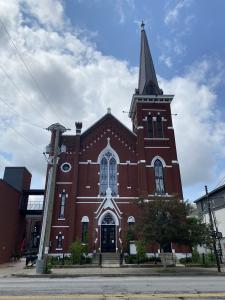
The Grace of God in Christ’s Church
Truly, the death and resurrection of Jesus is the only means of our salvation from hellfire, and faith is the instrument by which we receive this gift. Yet, we cannot use this instrument of our own volition; God’s grace is completely and entirely requisite to the Christian life. It not only precedes a believer’s ability to do good works, but also faith itself. In John Wesley’s revision of the 39 Articles of Religion, we read about man’s shortcomings in matters of salvation in greater detail. Article 8 is as follows:
“The condition of man after the fall of Adam is such that he can not turn and prepare himself, by his own natural strength and works, to faith and calling upon God; wherefore we have no power to do good works, pleasant and acceptable to God, without the grace of God by Christ…”
Devoid of that which must first come from God, we would be unable to endure His wrath, that is, the Lord’s just response to ungodliness. We need grace, and grace is found most abundantly in the Body of Christ, the Church. The good news of Jesus Radiates out from the Church, and it fetches sinners. It is proclaimed to the unconverted both through the preaching of the word, and through those acts of lovingkindness that flow forth from a people who have been transformed by the indwelling of the Holy Spirit.
Grace is also dispensed by God and shared within the Church’s bounds. The sacraments as means of grace are administered to the community of believing, members of the Church are continually confronted with the transformative and healing power of God’s word, and the gifts of the Spirit are used in accordance with Peter’s prescription in the first epistle that bears his name: “As each has received a gift,” the disciple says, “use it to serve one another, as good stewards of God’s varied grace.” (1 Pet. 4:10)
The Church as Ark
Because the Church is the primary conduit through which God metes out His unmerited favor, it should come as no surprise to learn that theologians in the early church often compared the Church to Noah’s Ark. In this very familiar story from Genesis, God saved the human race by preserving a single family from the great deluge that he sent to eradicate the moral darkness that had pervaded the earth. The Ark of Noah carried a righteous few through flood waters in that bygone era. In the age that is to come, the Church, as the circle by which God extends His saving grace, will carry the redeemed across the infernal waves of the Lake of Fire.
Today’s post presents the beginning of a short sermon on the Church and Noah’s Ark. Over the course of two entries, this sermon will be broken up into three main sections. In the first, which is the subject of today’s write-up, I will begin by readdressing the Ark of Noah, detailing its purpose and describing how it was used by God to save humanity. For the second part (Pt. 2), attention will be shifted away from the story of the Flood and redirected to the Church; an attempt will be made to give an answer to one deceptively simple question, “What is the Church?” The sermon will then conclude (also Pt. 2) by showing some of the ways in which Noah’s Ark should be viewed as a fitting image for the Church of Christ. So let’s begin with the Ark of Noah…
Promise in the Midst of Chaos
After sin’s introduction into the world through the transgression of our first parents, evil took hold of the consciences of men. The first born of a woman inherited, alongside the gift of life, a corrupt nature that stemmed from a single choice that had been forbidden by God. If Adam and Eve had not eaten from the Tree of the Knowledge of Good and Evil, their eldest son, Cain, would not have slain his brother. Yet, we know, from the pages of Genesis, that the very first child that was born grew up to become the first murderer on earth. Adam’s youngest died. That much is clear. But man’s hope for deliverance was not buried with him. Following Cain’s misdeed, God rekindled the expectation of redemption when Adam sired Seth, and Seth begot Enosh for “at that time people began to call upon the name of the Lord.” (Gen. 4:26)
Throughout this early age of man, two streams emerged from the offspring and actions of Adam. One was a righteous minority, the descendants of Seth. The other, a flourishing sinful majority that welcomed sin and death with open arms. Over the years, the growing wickedness of the second stream became tremendous and eventually, it arrived at a breaking point; nine generations from Adam, the Lord spoke to a blameless man named Noah and declared his intent to destroy the earth and all the nefarious persons that dwelt upon it. “God said to Noah, “I have determined to make an end of all flesh, for the earth is filled with violence through them. Behold, I will destroy them with the earth.” (Gen. 6:13)
A Righteous Man in God’s Sight
God was set to reveal His holiness through just intervention, as He refused to allow wicked men to persist in sinfulness. They, and everything that had been polluted by their evil deeds, required cleansing; a new beginning was imminent and because Noah walked with his Creator and was righteous in God’s sight, that beginning was to be founded on him. “Make yourself an ark of gopher wood.” The Lord said to the upright man. “Everything that is on the earth shall die. But I will establish my covenant with you and you shall come into the ark, you, your sons, your wife, and your son’s wives with you.” (Gen. 6:17-18) With these words, a plan to preserve God’s faithful image-bearers was made known to Noah; life was promised to him amidst the news of earth’s impending destruction. All that he had to do was obey the words of his Lord and fashion a floating fortress made of wood.
The ark, this stronghold that Noah was instructed to build and enter into, was a boat, but not an ordinary one. It was a vessel of monumental proportions, a refuge to those whom God granted safe harbor from His wrath, and a shelter to, quite literally, weather the storm. Alongside Noah and his family, other living beings were also given quarters within the ancient ship. “they and every beast, according to its kind, and all the livestock according to their kinds and every creeping thing that creeps on the earth, according to its kind, and every bird, according to its kind, every winged creature. They went into the ark with Noah, two and two of all flesh in which there was the breath of life.” (Gen. 7:14-15)
All Flesh Died That Moved on the Earth
The Divine plan of Almighty God was to preserve His creation through a remnant; eight humans and every different variety of animal were gifted safety on the lifeboat that was constructed by Noah in his obedience to the Lord. And after the righteous man performed all that God had commanded him—building the ark, entering it, and ensuring that his family and the host of different creatures did the same—God sealed His covenant with Noah by sealing the door of the Ark behind them. “On that day all the fountains of the great deep burst forth, and the windows of the heavens were opened. And rain fell upon the earth forty days and forty nights.” (Gen. 7:11-12) Those predetermined to inhabit the ark escaped as the rains began to fall. The others perished in the flood waters of God’s righteous judgment. In fact, we read in Gen. 7:23 that “Only Noah was left, and those who were with him on the ark.”
In my next post, I will continue our exploration of Noah’s Ark and the Church by considering what is actually meant by the words, “the Church.”


